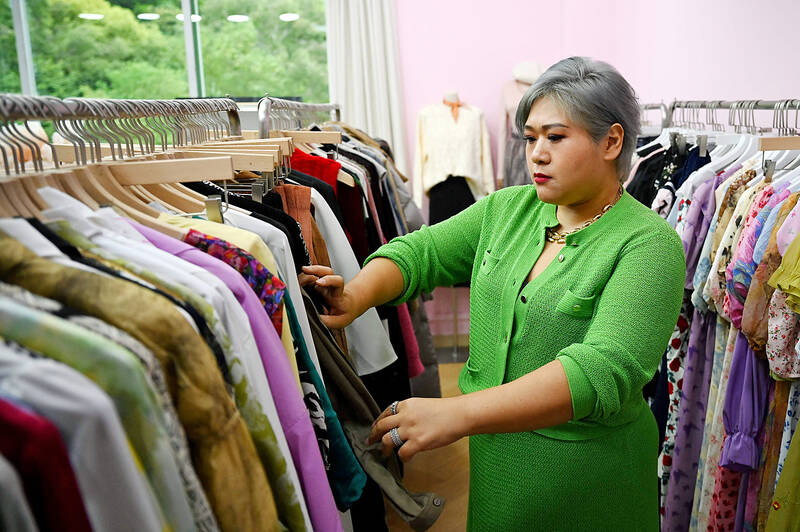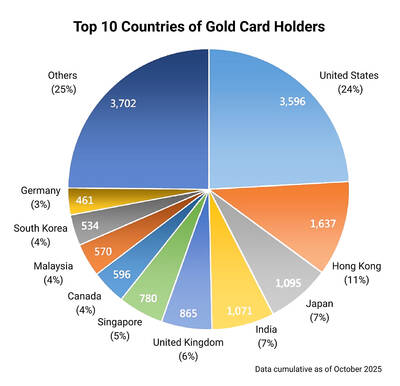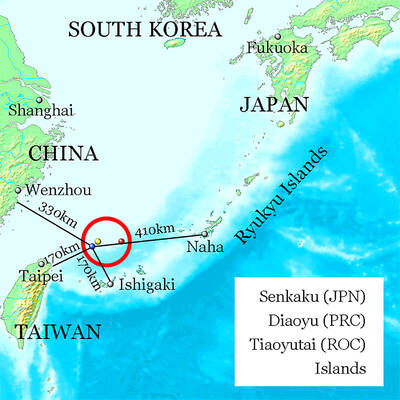Surrounded by racks of colorful dresses and blazers in China’s manufacturing hub of Guangzhou, plus-size clothing brand owner and influencer Amanda Yao is on a mission to promote body positivity.
She is part of a small but growing number of women in China challenging restrictive beauty standards, including thinness, pale skin and childlike features.
Online, a frequently circulated saying claims that “there are no good women over 50 kilograms,” while recent social media challenges have women squeezing into children’s clothes or showing off the coins they can stack on their collarbones.

Photo: AFP
Yao makes fashionable, high-end clothing for plus-size women, offering a vibrant contrast to the poorly cut offerings normally available in “slimming” dark colors.
“I want my customers to have clothes that express who they are inside, rather than soulless pieces that exist only to make them look thinner,” the 35-year-old said.
When it comes to clothing, most Chinese retailers focus on smaller sizes and “think that larger people don’t need fashion and don’t need beautiful clothes,” Yao said. “But we have work, we have families, we have respectable lives, and we also need some fancy clothes sometimes.”
To promote her online store, Yao posts pictures of her outfits on the Instagram-like Xiaohongshu app, often sporting leggings and tight-fitting workout tops she wears to climb the hills near her office.
“Reject body anxiety,” Yao, who openly talks about weighing 100 kilograms, wrote in one post to her more than 15,000 followers. “So what if I wear a strappy top and have big arms?”
EMBRACING COLOR
Yao began selling plus-size clothing four years ago after returning to China from the UK, where she had worked for several years.
“I found it especially hard to buy clothing here,” she said.
Items ordered online often failed to match sellers’ photos, and Yao grew sick of “very ugly clothes.”
In her Guangzhou office and showroom this month, Yao showed off a Chinese-style pink silk jacket from her brand Yue Design, while modeling a bright green cardigan and skirt set.
“I never post photos of myself wearing black online,” Yao said.
By avoiding the color traditionally recommended for larger women, she has also encouraged some of her customers to embrace brighter, more cheerful designs.
While clothing options for plus-size shoppers remain limited, some Chinese brands have taken steps to be more inclusive in recent years.
Lingerie brand Neiwai and loungewear company An Action A Day have featured larger models in their ads, though most of their items only cater to women up to 70 kilograms.
BODY SCRUTINY
Aside from Yao, other influencers in China have found an audience eager for their posts about self-acceptance and photos of themselves enjoying clothing and food, despite the pressure to diet.
On Xiaohongshu, the hashtag “reject body anxiety” appears in nearly 200,000 posts. But this is still a marked deviation from most body image content on Chinese social media.
One recent popular format involves someone posting a photo of themselves and asking viewers for makeover tips.
These posts often draw extreme scrutiny from commenters, who pick on people for flaws as specific as having a square jaw rather than the “ideal” pointed chin.
With constant exposure to idealized body types, people “start to conflate the meaning of their own worth with what they look like,” said Stephanie Ng, who runs Hong Kong-based mental health organization Body Banter.
That has dangerous consequences, including extreme dieting and eating disorders, Ng said. There is little official data on eating disorders in China, but the prominent Shanghai Mental Health Center reported an increase from eight such patients in 2002 to 3,000 in 2021, according to state broadcaster CGTN.
Even though Yao has built a loyal following, her posts can also attract cruel comments.
“Daring to post an ugly photo showing your ring-shaped torso fat doesn’t equal confidence,” one commenter wrote under one of Yao’s workout posts.
She said that the criticism has only made her more determined.
“I want to help women who are feeling self-hatred to look at themselves in a new way,” she said.

Seven hundred job applications. One interview. Marco Mascaro arrived in Taiwan last year with a PhD in engineering physics and years of experience at a European research center. He thought his Gold Card would guarantee him a foothold in Taiwan’s job market. “It’s marketed as if Taiwan really needs you,” the 33-year-old Italian says. “The reality is that companies here don’t really need us.” The Employment Gold Card was designed to fix Taiwan’s labor shortage by offering foreign professionals a combined resident visa and open work permit valid for three years. But for many, like Mascaro, the welcome mat ends at the door. A

Last week gave us the droll little comedy of People’s Republic of China’s (PRC) consul general in Osaka posting a threat on X in response to Japanese Prime Minister Sanae Takaichi saying to the Diet that a Chinese attack on Taiwan may be an “existential threat” to Japan. That would allow Japanese Self Defence Forces to respond militarily. The PRC representative then said that if a “filthy neck sticks itself in uninvited, we will cut it off without a moment’s hesitation. Are you prepared for that?” This was widely, and probably deliberately, construed as a threat to behead Takaichi, though it

Nov. 17 to Nov. 23 When Kanori Ino surveyed Taipei’s Indigenous settlements in 1896, he found a culture that was fading. Although there was still a “clear line of distinction” between the Ketagalan people and the neighboring Han settlers that had been arriving over the previous 200 years, the former had largely adopted the customs and language of the latter. “Fortunately, some elders still remember their past customs and language. But if we do not hurry and record them now, future researchers will have nothing left but to weep amid the ruins of Indigenous settlements,” he wrote in the Journal of

If China attacks, will Taiwanese be willing to fight? Analysts of certain types obsess over questions like this, especially military analysts and those with an ax to grind as to whether Taiwan is worth defending, or should be cut loose to appease Beijing. Fellow columnist Michael Turton in “Notes from Central Taiwan: Willing to fight for the homeland” (Nov. 6, page 12) provides a superb analysis of this topic, how it is used and manipulated to political ends and what the underlying data shows. The problem is that most analysis is centered around polling data, which as Turton observes, “many of these